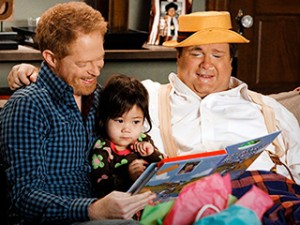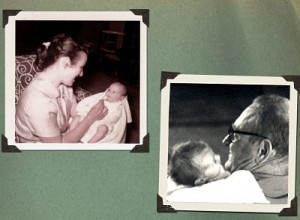
Mitchell, Lily & Cam, “Modern Family”‘s adoptive family
Talking about adoption honestly supports healthy emotional development for both children and parents. Yet it is not always the easy choice. False cheer and inaccurate platitudes often feel like the less challenging way to go. (As Mitchell discovered in a light-hearted treatment of this issue on a recent Modern Family. He found it easier to tell Lily her mother was a princess–until she became obsessed with princesses!)
The road to adoption is invariably a challenging one for many adoptive parents, marked by many losses—the children they might have had, but for infertility; the children they lost through miscarriage, stillbirth, or death; the gauntlet of waiting punctuated by emotional soars and dips; the glare of double-edged socio-cultural attitudes. Sometimes pieces of themselves feel chipped away—their sense of competence, wholeness, worthiness, and so many other essential yet changeable components of self.
By the time their long-awaited adopted child is placed in their arms, parents often—and understandably—just want to put all the heartache behind them and move on into the joyful realms of mothering and fathering. But their very real feelings of loss need to have a place in the story of their new family, or they can cast ever-lengthening shadows on the relationship between parents and child.
Ways of Talking About Adoption
Adopted kids often grow up with such mantras as “Being adopted is just another way to become a family.” While it is true that adoption is another way of building a family, the tender complexities of adoption are ill-described by the breezy nonchalance of “just another way.” Talking about adoption in this manner dismisses and minimizes a profound experience which has involved not only the parents’ deep losses, but the child’s loss of the parents who couldn’t keep him.
With the best of intentions, adoptive parents often convey half-truths about the implications of adoption to shield their child from the pain of loss which is inherent in the experience.
“Adoptive parents are really trying to do the right thing, and it feels like avoiding pain is the right thing, but it truly is not,” says therapist Wendy McCord. “They need to look at their good intentions and re-frame them, because hiding from the feelings doesn’t help their child.”
“Other mommies and daddies had to take what they got, but we got to choose you,” is another well-intentioned but ultimately destructive white lie told to many adopted children. While it clearly wouldn’t be appropriate to share with them what is often the actual truth—that they tried everything possible to have their own child before deciding to adopt—it is crucial for parents to share the essence of the truth with their adopted children, the feelings hovering beneath the facts. It fosters trust and, perhaps paradoxically, a sense of security in the child.
Annette Baran, late author of the groundbreaking The Adoption Triangle, said, “Adoptive parents must weep with their child: ‘We’re sorry, too, that you didn’t grow in Mommy’s tummy.’”
Permission to Speak From the Heart
“I think parents don’t realize they’re allowed to show these feelings,” explained Baran. “They think they have to present an unflagging cheerfulness about adoption in order that the children will feel positive, too, which is a misconception.”
Parents who demonstrate emotional openness send a healthy message to their child that he or she is allowed to express a full range of feelings, not just the “nice” ones.
“Parents whose children express sadness usually feel that they need to reassure them, rather than feel the sadness along with them. But having lost an original set of parents is something to feel sad about, and the best any parent can do for a child is to allow them to share those feelings of loss with them,” explained Baran.
Dr. McCord acknowledges that supporting a child in this empathic manner can be emotionally challenging for adoptive parents. “It forces them to feel their own loss about not having their own biological child, and it also will trigger any issues of what they may have lost in their relationships with their own parents.”
It may seem easier, especially in the beginning, to avoid these uncomfortable feelings when talking about adoption. But glossing over them with cheerful slogans isn’t the loving choice, for it ultimately deprives both parents and child of genuine intimacy. Children who grow up with that kind of pretense and denial often report that they have superficial, “walking on eggshells” relationships with their parents.
By contrast, parents who allow a child to explore all of the complex feelings—and questions—that are a natural part of the adoptive experience lay a solid foundation of trust and honesty for a deep, authentic connection with their child.

Bee and Bob with their new baby, Marcy
As attuned parents know, children are creatures of intuition—they respond to the truth behind our words rather than the words themselves. And if the truth we’re telling them isn’t the whole truth, they perceive in this discrepancy that there is something intangibly wrong about themselves. In my own experience, it has taken me much of my adult life to unlearn that early, stunting lesson…to finally get it, deep in my marrow, that there wasn’t something unspeakably wrong about me, but rather, something that my parents couldn’t face, and share: the difficult realities that surrounded my adoption.
When we deny adoption’s losses, we also deny ourselves its fullest blessings. Talking about adoption honestly invites trust, intimacy, and emotional wellbeing for everyone in the family.
*** Part of November’s National Adoption Awareness Month series ***
Image:
“Modern Family” from Thrasher Home blog
Tags: adoptee, adoption, adoptive parents, infertility, miscarriage, stillbirth


